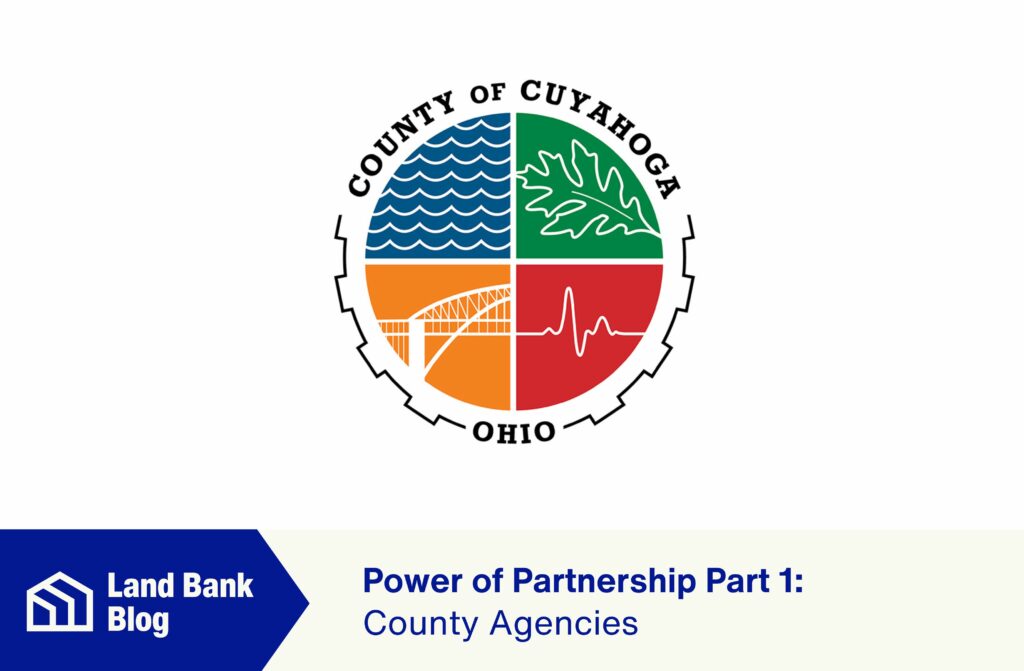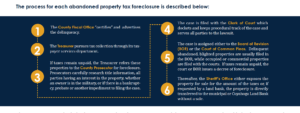The Power of Partnership: Cuyahoga Land Bank’s Collaborative Approach

Part 1: Building Together in Partnership With County Agencies
Cuyahoga Land Bank directly addresses issues like abandoned housing, tax delinquency and urban decay, which are often barriers to economic growth, through its role as a strategic intermediary in the complex process of reclaiming and repurposing blighted properties. This work is not simply about acquiring vacant land, but rather leveraging properties to drive broader county objectives.
Cuyahoga Land Bank operates within a network of Cuyahoga County entities, collaborating to revitalize neighborhoods and promote economic development. By strategically acquiring and redeveloping these properties, it helps implement the county’s plans for neighborhood revitalization, affordable housing and commercial development.
In essence, Cuyahoga Land Bank is a key tool for implementing the county’s development strategies, and it relies on close cooperation with these various county entities to address complex real estate challenges and achieve sustainable community development.
Here’s a breakdown of our key Cuyahoga County partners.
The Cuyahoga County Department of Development is vital in fostering economic growth and community revitalization. They achieve this through a variety of initiatives, including attracting and retaining businesses, supporting workforce development programs and investing in infrastructure improvements. The Department of Development and Land Bank work together to promote economic revitalization. They coordinate efforts to attract investment, create jobs and improve quality of life in Cuyahoga County, which includes coordinating larger development projects and ensuring that Land Bank properties are used to maximize economic impact.
The Cuyahoga County Office of the Executive, led by County Executive Chris Ronayne, serves as the administrative head of the county government. This office is responsible for managing and operating county departments and agencies, implementing policies and initiatives, and overseeing the county’s budget. Ultimately, the Executive’s office strives to ensure efficient and effective delivery of county services and improve the quality of life for all Cuyahoga County residents. The County Executive plays a direct role, as they (or their designee) hold a position on the Cuyahoga Land Bank’s Board of Directors ensuring alignment between the Land Bank’s activities and the county’s overall strategic goals.
The Cuyahoga County Council serves as the legislative branch of Cuyahoga County government, responsible for enacting laws and policies that affect the county. They also oversee the county’s budget, appropriating funds for various county services and initiatives. The County Council also has representation on the Land Bank’s board, providing legislative oversight and ensuring that the Land Bank’s operations are consistent with county policies.They are also involved with the funding of various projects that the Land Bank undertakes.
The Cuyahoga County Planning Commission develops and implements comprehensive plans for the county’s physical development, focusing on land use, transportation and infrastructure. They also provide technical assistance to local governments on planning-related matters, promoting coordinated and sustainable growth. The Planning Commission’s expertise in land use and development is crucial to the Land Bank’s work, and collaboration helps ensure that property redevelopment aligns with broader county planning initiatives. The planning commission also helps to provide information about future planning that can affect land bank decisions.
The Land Bank’s work relies on close collaboration between several county agencies. Because strategic tax foreclosure is crucial for neighborhood stabilization, interagency coordination and data sharing are essential. The skill and dedication of these agencies are vital to community development efforts undertaken by cities, the county, housing organizations and other non-profits.
The Cuyahoga County Fiscal Officer is responsible for key functions related to property, including accurate property appraisals, maintaining records of property ownership and transfers, and overseeing the calculation and distribution of property taxes.
The Cuyahoga County Treasurer’s office is primarily responsible for the collection and management of property tax payments.
The Cuyahoga County Prosecutor’s office may be involved in real estate matters primarily through prosecuting fraud related to property transactions, handling foreclosures on behalf of the county, or addressing property-related criminal activity.
The Cuyahoga County Clerk of Courts maintains records of real estate-related court proceedings, such as foreclosures, evictions and title actions.
The Cuyahoga County Board of Revision hears and decides property owner appeals regarding the valuation of their real estate for tax purposes.
The Cuyahoga County Court of Common Pleas handles legal disputes involving real estate, including foreclosures, partition actions, quiet title suit, and other property-related civil cases.
The Cuyahoga County Sheriff’s Office carries out court-ordered actions related to real estate, such as serving eviction notices and conducting sheriff’s sales of foreclosed properties.
